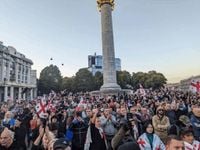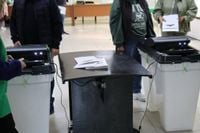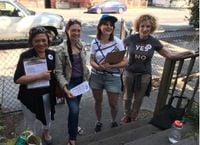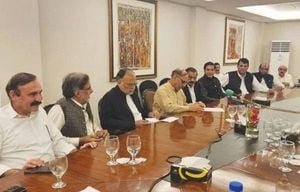Georgia’s local self-government elections, held on October 4, 2025, became a flashpoint for political tensions, mass protests, and claims of sweeping victory by the ruling party, all against a backdrop of reported irregularities and a partial opposition boycott. By the time polls closed at 8 p.m., the Central Election Commission (CEC) announced that 1,438,116 voters—representing 40.93% of the country’s 3,513,818 eligible voters—had cast their ballots. The day’s events, as reported by multiple outlets including Civil Georgia and APA, unfolded with both the ordinary rhythm of democracy and the extraordinary drama of a nation at a crossroads.
Polling stations opened at 8:00 a.m. and closed twelve hours later, with 3,061 locations operating across the country—2,284 equipped with electronic systems and 777 using traditional paper ballots. An additional ten polling stations were set up in penitentiary institutions. Voters faced a choice among twelve registered political parties, with ballots listing contenders such as “Homeland, Language, Faith,” “Georgian Dream-Democratic Georgia,” and “Strong Georgia-Lelo.” In Tbilisi, the capital, nine mayoral candidates vied for office, while all twelve parties submitted lists for the City Council elections. Across Georgia’s 63 other municipalities, 112 mayoral candidates were registered, including four nominated by initiative groups. In total, 2,228 candidates ran in local single-mandate electoral districts, with 160 of those in Tbilisi alone.
Despite the procedural normalcy, the elections took place under the shadow of a partial opposition boycott, with the vote marred by allegations of government repression, the jailing of protesters and opposition members, and a crackdown on independent media and watchdog organizations. According to Civil Georgia, the authorities’ actions and the environment leading up to the vote raised questions about the credibility of the process. The 2025 turnout was notably lower than previous years: the 2021 local polls saw a turnout of 51.92% by 8 p.m., and the 2024 parliamentary elections reached 58.94% at the same hour. The highest regional turnout this year was in Racha-Lechkhumi and Kvemo Svaneti (58.77%), while Tbilisi lagged behind at just 31.08%.
CEC spokesperson Natia Ioseliani summarized the day as “mostly peacefully and safely” conducted. At a 9 p.m. briefing, she explained, “In a few isolated cases, incidents and technical issues were recorded; however, in all such instances, the electoral administration responded promptly and in accordance with the law.” The CEC had received 24 complaints, mainly concerning violations of rules for photo and video recording, polling station arrangements, and voter registration procedures outside polling stations. These complaints, while relatively few, added to the growing sense of unease among opposition groups and civil society observers.
Allegations of more serious irregularities surfaced throughout the day. Representatives from Lelo/Strong Georgia and its ally For Georgia claimed to have documented vote-buying, carousel voting, and obstruction by precinct commission members who reportedly blocked the installation of surveillance cameras. Tazo Datunashvili of Lelo highlighted a “trend” of voters allegedly receiving two ballots instead of one, and reported damage to electronic registration devices at several polling stations. These claims, as reported by Civil Georgia, fueled suspicions about the integrity of the process, although the election administration maintained that all incidents were addressed in line with the law.
Observers from 28 international and 27 local organizations monitored the proceedings, while nearly 1,000 journalists from 73 media outlets reported on the events. By 5:00 p.m., the CEC reported that 1,175,817 voters—33.5% of the electorate—had cast their ballots, foreshadowing the final turnout figure. The CEC indicated that preliminary results based on electronic precincts would be available within one to two hours after the polls closed, with final results to follow after all ballots were counted by hand.
Yet, even as voting wrapped up, the nation’s attention shifted to the streets. From 4 p.m., a parallel mass rally gathered at the parliament in Tbilisi, with demonstrators calling for the “peaceful overthrow” of the Georgian Dream government. As evening fell, thousands of protesters—students, opposition supporters, and ordinary citizens—marched from Tbilisi State University toward Parliament, converging on Rustaveli Avenue. Their aim, described as a “peaceful revolution,” was soon met with a heavy police presence.
Tensions boiled over around 7 p.m. at Liberty Square and Atoneli Street, where some rally participants attempted to storm the presidential palace. Riot police responded swiftly, deploying pepper spray and dispersing the crowd. The Interior Ministry later accused rally organizers of inciting violence, damaging security barriers, and attempting to break into the palace. Protesters set fire to barricades near Liberty Square, prompting an intensified police deployment throughout central Tbilisi.
In the midst of the turmoil, United National Movement member Murtaz Zodelava addressed demonstrators, declaring that state power had “reverted to the people” and urging the crowd to mobilize and reclaim the presidential palace. Georgia’s Fifth President, Salome Zurabishvili, took to social media to denounce the attempted takeover, writing, “This mockery of taking over the presidential palace can only be staged by the regime to discredit the 310 days peaceful protest of the Georgian people. As the legitimate President, I formally reject this and continue standing with my people peacefully until we win new elections.”
Amidst the chaos, the ruling party moved quickly to claim victory. Georgian Dream posted on Facebook, “We started on the 4th and finished on the 4th,” referencing the protest movement’s slogan about toppling the regime in one day. Prime Minister Irakli Kobakhidze, in a late-night briefing—despite the CEC not yet releasing official results—stated the party had surpassed 70% in all municipalities and described the turnout as “very high” for local elections. “We have won in all municipalities in the first round,” he asserted, echoing the party’s confidence in its mandate.
As night fell on October 4, 2025, the streets of Tbilisi remained charged with protest, the official results still pending, and the future of Georgia’s democracy hanging in the balance. The day’s events underscored not just the importance of the ballot box, but also the enduring power of public assembly and the deep divisions shaping the nation’s political landscape.






